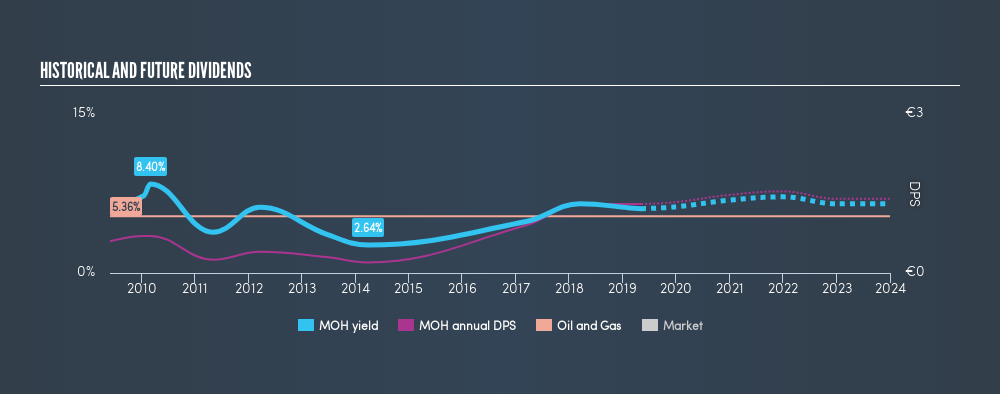- Greece
- /
- Oil and Gas
- /
- ATSE:MOH
Is Motor Oil (Hellas) Corinth Refineries S.A.'s (ATH:MOH) 6.1% Dividend Worth Your Time?

Want to participate in a short research study? Help shape the future of investing tools and you could win a $250 gift card!
Dividend paying stocks like Motor Oil (Hellas) Corinth Refineries S.A. (ATH:MOH) tend to be popular with investors, and for good reason - some research shows that a significant amount of all stock market returns come from reinvested dividends. Yet sometimes, investors buy a stock for its dividend and lose money because the share price falls by more than they earned in dividend payments.
In this case, Motor Oil (Hellas) Corinth Refineries likely looks attractive to investors, given its 6.1% dividend yield and a payment history of over ten years. It would not be a surprise to discover that many investors buy it for the dividends. There are a few simple ways to reduce the risks of buying Motor Oil (Hellas) Corinth Refineries for its dividend, and we'll go through these below.
Explore this interactive chart for our latest analysis on Motor Oil (Hellas) Corinth Refineries!
Payout ratios
Dividends are usually paid out of company earnings. If a company is paying more than it earns, then the dividend might become unsustainable - hardly an ideal situation. Comparing dividend payments to a company's net profit after tax is a simple way of reality-checking whether a dividend is sustainable. Looking at the data, we can see that 56% of Motor Oil (Hellas) Corinth Refineries's profits were paid out as dividends in the last 12 months. This is a healthy payout ratio, and while it does limit the amount of earnings that can be reinvested in the business, there is also some room to lift the payout ratio over time.
Another important check we do is to see if the free cash flow generated is sufficient to pay the dividend. The company paid out 78% of its free cash flow as dividends last year, which is adequate, but reduces the wriggle room in the event of a downturn.
We update our data on Motor Oil (Hellas) Corinth Refineries every 24 hours, so you can always get our latest analysis of its financial health, here.
Dividend Volatility
One of the major risks of relying on dividend income, is the potential for a company to struggle financially and cut its dividend. Not only is your income cut, but the value of your investment declines as well - nasty. Motor Oil (Hellas) Corinth Refineries has been paying dividends for a long time, but for the purpose of this analysis, we only examine the past 10 years of payments. Its dividend payments have fallen by 20% or more on at least one occasion over the past ten years. During the past ten-year period, the first annual payment was €0.60 in 2009, compared to €1.30 last year. Dividends per share have grown at approximately 8.0% per year over this time. The dividends haven't grown at precisely 8.0% every year, but this is a useful way to average out the historical rate of growth.
A reasonable rate of dividend growth is good to see, but we're wary that the dividend history is not as complete as we'd like.
Dividend Growth Potential
With a relatively unstable dividend, it's even more important to evaluate if earnings per share (EPS) are growing - it's not worth taking the risk on a dividend getting cut, unless you might be rewarded with larger dividends in future. Strong earnings per share (EPS) growth might encourage our interest in the company despite fluctuating dividends, which is why it's great to see Motor Oil (Hellas) Corinth Refineries has grown its earnings per share at 45% per annum over the past five years. Earnings per share are sharply up, but we wonder if paying out more than half its earnings (leaving less for reinvestment) is an implicit signal that Motor Oil (Hellas) Corinth Refineries's growth will be slower in the future.
Conclusion
To summarise, shareholders should always check that Motor Oil (Hellas) Corinth Refineries's dividends are affordable, that its dividend payments are relatively stable, and that it has decent prospects for growing its earnings and dividend. First, we think Motor Oil (Hellas) Corinth Refineries is paying out an acceptable percentage of its cashflow and profit. We were also glad to see it growing earnings, but it was concerning to see the dividend has been cut at least once in the past. While we're not hugely bearish on it, overall we think there are potentially better dividend stocks than Motor Oil (Hellas) Corinth Refineries out there.
Companies that are growing earnings tend to be the best dividend stocks over the long term. See what the 7 analysts we track are forecasting for Motor Oil (Hellas) Corinth Refineries for free with public analyst estimates for the company.
We have also put together a list of global stocks with a market capitalisation above $1bn and yielding more 3%.
We aim to bring you long-term focused research analysis driven by fundamental data. Note that our analysis may not factor in the latest price-sensitive company announcements or qualitative material.
If you spot an error that warrants correction, please contact the editor at editorial-team@simplywallst.com. This article by Simply Wall St is general in nature. It does not constitute a recommendation to buy or sell any stock, and does not take account of your objectives, or your financial situation. Simply Wall St has no position in the stocks mentioned. Thank you for reading.
About ATSE:MOH
Motor Oil (Hellas) Corinth Refineries
Motor Oil (Hellas) Corinth Refineries S.A.
Mediocre balance sheet second-rate dividend payer.
Market Insights
Community Narratives





